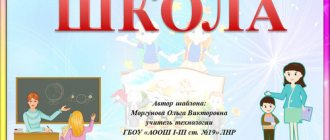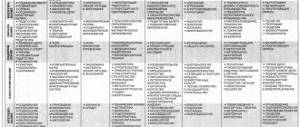Parent meeting on career guidance
October 13, 2019
Training session with parents
"Career guidance at home"
(10th grade parent meeting as part of career guidance work)
Goals:
— involving parents in discussing issues related to planning “life after school” for the future teenager;
— optimization of the distribution of responsibility for decision-making in the system of parent-child relations.
Materials:
pens, sheets of paper, questionnaire “Do you know your child?”, cards with situations, “Professional Choice Questionnaire”, “Professional Choice Matrix”.
Progress of the lesson:
Introductory conversation.
For young people, the transition between school and work becomes a defining moment for lifelong personal and professional development. At this age stage, a young person gets the opportunity to make independent choices and take responsibility for them.
But are all graduates conscious about planning their future professional activities? According to statistics, 30% of students drop out without graduating from university, 60% of university graduates and 70% of graduates of vocational schools do not work in their specialty.
The implementation of the idea of a profile at the senior level of school is aimed at the formation of preliminary self-determination of the graduate in relation to vocational education.
As part of pre-vocational training, it is assumed that by the age of 14–15 years, a teenager is ready to independently or with the help of his immediate environment and specialists, assess his abilities and interests, and carry out some preliminary professional
choice, predict the consequences of their decisions and then engage in systematic, purposeful activities in accordance with their educational goals.
The transitional age of children is an indicator that a normative crisis may develop in the family. Its essence lies in the redistribution of power in the family. There comes a time when parents need to share the enormous power they have with their growing child, since the educational mission in relation to the child has been exhausted or is coming to an end.
It should be noted that conservative patterns of family life, as a rule, force families to cling to familiar stereotypes. Any new thing, any attempts at change cause fear and resistance. At this stage, parents are required to restructure their ways of communicating with their teenager.
Today we will try to play through the moments of the relationship between a parent and a teenager as part of the choice of a future professional path.
Exercise 1. “Time Machine”
Imagine being transported back a few years.
— How did you imagine your professional future?
— Who and how helped you in implementing your plans?
— How did your parents react to your choice?
— Were there any disagreements about your choice with your parents?
— What personal qualities and skills helped you realize your plans?
— Have your dreams come true?
— Did you want to change something now?
Exercise 2. Situations
Suggest a way out of the current situation
Situation 1.
I will introduce you to our hero Ruslan and tell you a little about him. Ruslan is a good student, but there are no special achievements in his life. Likes to be the center of attention and is the leader of a small group of peers. The most striking feature that can still be noted is that he is very spoiled. He wants the best, and finds flaws in everything. Here's a recent example: he asked his parents to give him a cell phone for his birthday. They bought him the most expensive model, with a camera and a video camera. He didn’t like it: he said the buttons were the wrong size! After several days, I exchanged the phone for another model among older teenagers I knew to my advantage. And so in everything: discusses, criticizes, but never loses. Yes, he is now in ninth grade. The time has come to choose a profession...
- What profession should he choose? Suggest a number of professions, describing their advantages and disadvantages.
Situation 2.
Tanya is in 9th grade. She doesn't know what she wants to become yet. Tanya is an average student, although she has good grades in some subjects: biology, mathematics and literature. Tanya’s mother insists that Tanya improve in a number of subjects and enter medical school. But the girl is not very attracted to this, since in medical school she has to study a lot, and she is afraid that she will not be able to cope. Her friends persuade Tanya to go to college to study to become an accountant, and Tanya will most likely agree, since for her the main thing in life is communication and it’s difficult for her without friends.
- What should Tanya do? Which profession should I choose?
Exercise 3. The world of professions
What professions do you know that meet the requirements of the new century?
| Professions | Contents of the activity | Professionally important qualities | Where can I get an education? |
| 1. Art director | |||
| 2. Anti-crisis manager | |||
| 3. Broker | |||
| 4. Computer program designer | |||
| 5. Logistician | |||
| 6. Sales Manager | |||
| 7. Information security specialist | |||
| 8. Legal advisor |
Parents are given blank forms to fill out; later on the slides reveal the content of their activities (Appendix 1).
What are the requirements for the personality of a specialist from labor and employers?
The modern labor market requires from a person, in addition to professionalism, special responsibility, psychological and social readiness for self-education and self-development.
Based on the results of sociological surveys of employers, their main requirements for young specialists without work experience can be identified: depth of professional knowledge and understanding of all levels of their work; quality of work (thoroughness and accuracy of work); reliability; initiative (the degree of active interest in completing the work received); creativity and resourcefulness; endurance (the ability to concentrate and perform at the required productivity under stressful conditions); determination.
In addition, employers wanted young people to strive to enrich their life experiences; got rid of the consumer position; they tried to do everything themselves, rather than relying on the state, society, or enterprise; strived to make independent decisions and took responsibility; showed initiative; could critically and correctly evaluate themselves and their capabilities; sought to improve their interpersonal skills; worked intensively and with greater efficiency.
Employers note the advantages of young specialists over experienced workers. These include: high learning ability of young people; flexibility in decision making; mobility, the ability to easily master new technologies and technical processes; availability of modern knowledge (computer technology); interest in new technology; health, a lot of strength, energy; ability to work irregular hours; there is no stereotype of professional behavior; the desire to realize oneself, to make a career; willingness to work hard; installation for long-term work in the organization.
We dwelled on the main points of the professional choice of a life path, which is quite thorny and often not easy for many, but if the choice is made correctly, it brings satisfaction, the desire to realize oneself fully, to receive a worthy moral and material assessment of one’s work.
Reflection:
What conclusion can be drawn on this topic?
What did you like about the training?
What was important to you personally?
Your feelings and sensations after the training.
Annex 1
| Professions | Contents of the activity | Professionally important qualities | University |
| 1.Art – director | organizes the production of a film or play, holding a concert or tour; is responsible for preparations for filming or performances, the readiness of performers and staff, and creates conditions for their effective work; controls the safety of material assets; prevents and resolves conflict situations. | organizational skills; sociability; increased demands on attention and memory; developed verbal, logical and practical thinking. | |
| 2.Anti-crisis manager | analyzes the work of the organization, makes an expert assessment of the value of fixed assets and real estate of industrial and commercial enterprises, banks, insurance companies; advises on reorganization and liquidation of enterprises; carries out anti-crisis measures. | analytical and organizational skills; will, determination, responsibility, good attention and memory. | |
| 3. Broker | concludes a purchase and sale transaction on behalf of a client, whose search takes up most of the time. | sociability, analytical and organizational skills, increased demands on memory and attention | |
| 4. Computer program designer | develops software for users; combining color, sound, text, creates a complete sense of the reality of the situation being studied, the behavior of the student in this situation in accordance with the requirements of the customer; participates in advertising projects | analytical and creative abilities, creative imagination, selectivity of attention, figurative memory, developed visual-figurative and objective-effective thinking. | |
| 5. Logistician | monitors transportation (road, air, sea), plans purchases, controls warehouses, carries out customs preparations, prepares customs documentation, negotiates with transport companies and prepares contracts. | sociability, organizational skills, increased demands on attention and memory, verbal, logical and practical thinking. | |
| 6. Sales Manager | conducts an analysis of the purchasing power of the population in the region, advertises the product using knowledge of sales psychology; bears financial responsibility for the goods received, maintains material and financial records | sociability, good diction, increased demands on attention, large amounts of short-term and long-term memory, visual memory, developed practical and theoretical thinking | |
| 7. Information security specialist | is engaged in the development, adaptation and installation of software for protecting information on a computer network. | analytical abilities, increased demands on attention; a large amount of short-term and long-term memory, abstract-logical and objective-effective thinking. | |
| 8. Legal advisor | works in banks, stock exchanges, credit institutions, investment funds; provides advice on legal issues, securities portfolio management, financial management, financial risk assessment, assessment and selection of investment projects, organization of banking and insurance; provides representation in court, arbitration and other government organizations. | analytical abilities, responsibility, sociability, selectivity of attention, large amounts of short-term and long-term memory, verbal and logical thinking | |
| 9. HR specialist | implements management policies, establishes contacts between top managers and ordinary employees; are engaged in the selection and hiring of personnel, their training and development, and salary calculations; carry out personnel records management, etc. | analytical abilities, responsibility, sociability, selectivity of attention, large amounts of short-term and long-term memory, verbal and logical thinking |
“Professional guidance for graduates” Parents’ meeting. - presentation
“Professional guidance for graduates” Parents’ meeting
Who to be? “An honest and in his own way intelligent shoemaker, who masters his craft perfectly, is higher than a bad general, higher than a pedant - a scientist, higher than a bad poet.” V.G. Belinsky
First professional choice Firstly, the development of market relations in our country presupposes fierce competition in the labor market. The most knowledgeable and capable person wins. The faster a young person resolves a problematic situation with choosing a profession, the more time and opportunities he will have for targeted self-development and preparation.
First professional choice Secondly, the specificity of today's complete secondary education is that specialized training is introduced in classes. That is, the education of high school students is focused on a specific professional field.
First professional choice Thirdly, more and more new professions are appearing on the labor market with their own system of requirements for the candidate’s personality. Students either do not know information about these professions or have it in a limited and even distorted form.
Choosing a profession Interests Tendencies (I want to know) (I want to do) Choosing a profession Abilities
The right choice means success in your professional life! Our task as parents and schools is to promote the correct professional choice of children, to help them with smart advice, without reproaches or pressure.
The right choice means success in your professional life! Discuss plans with your children. It is important for children to know information about the professional activities of their parents, the work of the child’s relatives and friends. Stories about how parents themselves chose a profession, what difficulties they experienced, and what they took into account can also be useful.
Are “good” and “prestigious” professions always good? The proposed option must be assessed in terms of its compliance with the interests and abilities of the child.
Taking into account the needs of the labor market The demand for the professions of skilled workers is more than 50%: gas-electric welders, mechanics of various types of work, machine operators, drivers of automobiles and electric vehicles, builders, electricians, installers of equipment and apparatus. Service sector professions such as cutters, tailors, salespeople, cooks, and confectioners are in steady demand. About 30% are in specialist and office professions. For professions that do not require professional training 15%. Among specialists, teachers are in great demand (there are many of them trained, but less than half of graduates of pedagogical universities go to work in schools), engineers and craftsmen in various types of activities, mid-level medical workers
What do managers value in a person as an employee? high qualifications and professionalism; the ability to make decisions independently, defend them, the ability to stand up for oneself; initiative, activity, energy; assertiveness; ability to accurately follow instructions received, diligence; creativity, flexibility of thinking, ability to find non-standard solutions; the ability to communicate, make a favorable impression, the ability to interest the interlocutor, the ability to work in a team.
Portrait of a successful graduate - health; -activity; -self confidence; -creation; -good social adaptation; -interest in modern technology and technology.
Market of educational services Levels of professional education: primary vocational; secondary vocational; higher professional; postgraduate professional.
Ways of obtaining education 1) PU (PL) - technical school (college) - university; 2) technical school (college) - university; 3) correspondence or evening study at an educational institution and work. Choosing the optimal path to obtaining an education will maintain a state of psychological comfort.
How can I find out about vocational schools? Directory of educational institutions. Visit educational institutions of interest with your child: “Open Days”, “Days of Primary and Secondary Vocational Education”, “Days of Higher School”, “Fairs of educational places”. Visit the admissions office and get all the information you need.
“Task for parents” One of the most important tasks of parents is to help the child form a real idea of himself, his abilities, the strengths and weaknesses of his personality, the most and least successful aspects of his activities.
“Vaccination” against failure If a child does not fully cope with something, it is important to discuss these difficulties together, defining a program of action for the future. At the same time, the child needs to be made to understand that, despite his possible failures, his parents are always ready to support him in a difficult situation and help him gain self-confidence.
The backup option is another specialty in this educational institution; similar specialty in another educational institution; specialty in an educational institution of a different level (if a university is chosen, then a technical school or college may be a fallback option; if a technical school is chosen, then a vocational school or lyceum may be a fallback option).
To help graduates Server “Psychology for Education”: Resource Center in Nadym Psychologist’s office at school.
Areas of career guidance work: vocational education, vocational diagnostics, vocational counseling, development of interests and aptitudes of students.
V S E M!





